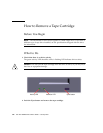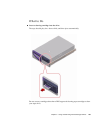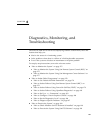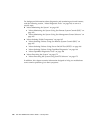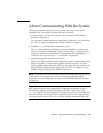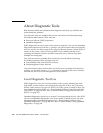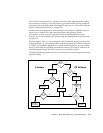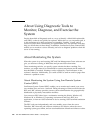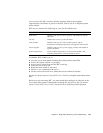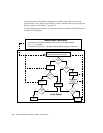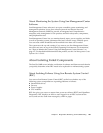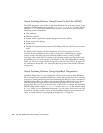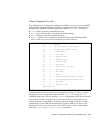
160 Sun Fire 280R Server Owner’s Guide • January 2001
About Diagnostic Tools
Both firmware-based and software-based diagnostic tools help you identify and
isolate hardware problems.
Two firmware tools are available that can run only before the Solaris Operating
Environment takes control. These tools are:
■ Power-on self-test (POST) diagnostics
■ OpenBoot Diagnostics
POST diagnostics can run as part of the power-on sequence. You can run OpenBoot
Diagnostics interactively from the ok prompt. You can run both of these tools locally,
and you can also run them remotely by using Sun Remote System Control (RSC) to
connect to the system console. However, RSC is not available until the server
operating environment software and RSC client and server software have been
installed and configured.
Two software tools are available that run directly from the Solaris Operating
Environment prompt. These software tools are:
■ Sun Validation Test Suite (SunVTS) software
■ Sun Management Center software
You can run both of these tools locally, and if the server operating environment is
running, you can also use the rlogin command to connect to the server remotely
and then use SunVTS or Sun Management Center software.
Local Diagnostic Tool Use
POST diagnostics verify the core functionality of the system, including the main
logic board, system memory, the central processing units (CPUs), the system bus,
and the cache memory. You can run POST even if the system is unable to boot. For
more information about POST, see “About Isolating Failures Using Power-On Self-
Test (POST)” on page 166 and “How to Isolate Failures Using Power-On Self-Test
(POST)” on page 179.
OpenBoot Diagnostics tests focus on system I/O and peripheral devices. Like POST,
you can run OpenBoot Diagnostics even if the system is unable to boot. For more
information about OpenBoot Diagnostics, see “About Isolating Failures Using
OpenBoot Diagnostics” on page 166 and “How to Isolate Failures Using OpenBoot
Diagnostics” on page 181.



